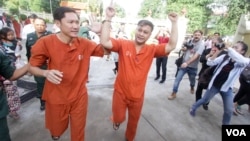One of the human rights workers jailed last year on charges widely believed to be politically motivated has fainted in his cell after suffering ill-health for months, according to his lawyers.
Ny Sokha, an Adhoc employee, was jailed along with three of his colleagues in May 2016 on bribery charges for allegedly trying to pay a witness not to testify in a case against the leader of the opposition.
Lor Chunthy, Sokha’s lawyer, said his client had fainted on Sunday afternoon. He added that this legal team had made requests to the prison authorities for Sokha to be transferred to hospital for medical treatment but had not been granted permission.
Chunthy said on Tuesday that Sokha’s blood pressure was dangerously low and he had filed a complaint to the Phnom Penh Municipal Court seeking intervention.
Judge Theam Chan Piseth, Chunthy alleged, had also banned medics from another local rights group from visiting his client in jail for the past three months.
“Before, the doctor visited him once a week or once a month, so his condition improved. But over the past three months, there has been no medical attention or medication provided,” Chunthy said.
Men Leakhena, Sokha’s wife, said her husband suffered from several ailments, which were exacerbated by stress and other conditions picked up in prison.
“He’s had no blood tests, so I’m concerned about his condition,” she said. “He needs to be treated in a hospital.”
“If he stays in prison, it will kill him.”
Am Sam Ath, monitoring manager at Licadho, the NGO whose medics were denied access to Sokha, said the prison had also stopped the group from visiting Sokha’s fellow detainees, Lim Mony, Yi Soksan and Nay Vanda.
“Until now ... the doctors have been unable to visit him,” he said.
Sorn Keo, prisons spokesman, claimed Sokha was in good health, and said he was being treated by prison service doctors.
Hul Reaksmey contributed to this report.




